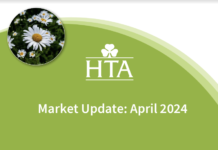Ellen Codd, Amsterdam office, Bord Bia – The Irish Food Board
With the rise in the importance of healthy lifestyles and environmental awareness, Dutch consumers are increasingly willing to pay extra for sustainable products. In 2017, 32% of consumers indicated that they would pay more for sustainable products, up from 29% in 2016, while one in five considers sustainability a more important factor than the price-quality ratio. The sustainable segment has become one of the most important growth segments in both retail and foodservice in recent years, with consumer spending on sustainable food increasing 26% year-on-year between 2015 and 2016. The market share of spending on sustainable food compared to total food expenditure has risen from 8% to 10%, growing to €3.8 billion in 2016.
In a category focus, spending on sustainable food increased in all product categories except for dairy. Meat and meat products experienced the largest growth, with a turnover of products with a quality mark in supermarkets growing by 110%.
As the importance of sustainability amongst consumers rises, so too does skepticism. Although almost three quarters of consumers feel it is important that companies make a positive contribution to society, less than one quarter believe that companies actually do this, and almost 40% mistrust claims about sustainability. Greater transparency and more communication with customers is needed – 40% of customers indicate that they don’t hear enough about a company’s engagement in sustainability.
This trend is not limited to the Netherlands, either – more than half of Europeans are willing to spend extra on food to improve the environment, while the sustainable food market is set to grow by 5% to $267.4bn in the US in 2018. Millennials are leading the field in this, while across the board consumers are taking steps such as buying local or organic, reducing meat consumption and household food waste, and choosing foods with recyclable or minimal packaging.
This is a great opportunity for Irish producers to engage with their customers and highlight their sustainability credentials.










